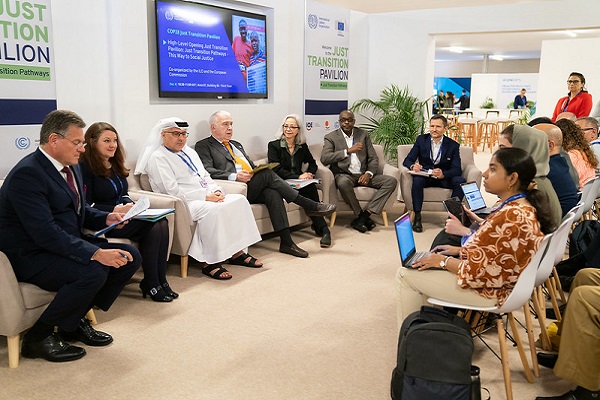
Keeping the social dimension of climate change at the forefront of discussions was the focus of events being organized in the Just Transition Pavilion at the Conference of Parties 28th session (COP28) in Dubai, UAE. For the second year in a row, the ILO and the European Commission are hosting the Just Transition Pavilion, a convening space for events, meetings and knowledge sharing around just transition and climate action in cooperation with the International Organisation of Employers (IOE), International Trade Union Confederation (ITUC), and United Nations Convention on Climate Change (UNFCCC).

On 4th December 2023, the Just Transition Pavilion hosted the High-Level Opening: Just Transition Pathway – This Way to Social Justice. This session included representatives from the Pavilion Hosts and organisers: Ms Celeste Drake, Deputy Director-General, ILO; Mr Maroš Šefčovič, Executive-Vice President, European Commission; Mr Roberto Suárez Santos, Secretary General, IOE; Mr Eric Manzi, Deputy General Secretary, ITUC; and Mr Daniele Violetti, Senior Director, UNFCCC. Guided by the moderation of Peter Rademaker, Deputy Director Regional Office Arab States, the panel delved into practical country examples of just transition pathways.
The Pavilion hosts not only reiterated their unwavering commitment to the principles of a just transition but also underscored their determination to institutionalize the Just Transition Pavilion as a lasting tradition at COP. Mr. Šefčovič specifically highlighted, “we are forging a tradition for years to come.” Ms Drake inaugurated the panel, emphasizing that “climate-resilient economies represent a tremendous opportunity to create decent work and promote inclusive growth.” She stressed the importance of effective social dialogue, leaving no one behind. Mr Šefčovič highlighted the necessity of incorporating just transition into the overall discussion at COP28. Taking a strong position on climate justice, social fairness, while promoting high-value jobs, is of high-priority on the European Commission agenda.
Social partners then addressed the audience, with the IOE Secretary General highlighting the imperative for effective climate action partnerships. He further noted how the lack of decent job opportunities and the neglect of skill development will jeopardise any just transition processes. The ITUC Deputy General Secretary urged parties to uphold the Paris Agreement’s mandate, emphasizing the importance of a just transition in creating quality jobs aligned with national development priorities. Lastly, Mr. Violetti commented on the ongoing successful negotiations at COP28, noting that a well-defined Just Transition Work Programme for the coming years is of upmost importance.
Country examples and just transition pathways
With the 2023 Resolution and conclusions on a just transition towards environmentally sustainable economies and societies for all, the ILO has a newly reinvigorated mandate in advancing a just transition in the multilateral system. Therefore, the ILO will be supporting constituents in their just transition advocacy at COP28. The is no-one size fits all, when it comes to just transition, and the country representatives provided insightful remarks on their respective countries’ experiences.
Examining national experiences, UAE Minister H.E. Dr. Al Awar underscored the country’s dedication to a sustainable future, viewing a just transition as a prosperous avenue to foster green industries. “UAE has launched a range of initiative to drive real change, the most ambitious of which being the UAE Net Zero by 2050, which aligns with the Paris Agreement and Kyoto Protocol.” Additionally, Ms. Lee, Deputy Undersecretary for International Labor Affairs in the USA, acknowledged that the objectives of COP28 hinge on a robust Just Transition Work Programme. The United States is actively advocating for a just transition domestically and globally, emphasizing inclusive social dialogue, labour rights, sustainable supply chains, and workforce reskilling.
The conversation further unfolded as H.E. Ken Ofori-Atta, Chairperson of the V20 Group representing the Government of Ghana, made additional contributions. The Vulnerable Twenty (V20) Group, comprised of Finance Ministers from the Climate Vulnerable Forum, is a specialized collaboration initiative, which sees the participation of 68 countries, involving economies highly susceptible to the impacts of climate change. The aim is to strengthen economies and financial responses to climate change. In this respect, the Minister highlighted how “climate change at this COP is an issue of justice.” The V20 has initiated a climate prosperity plans to call attention to the critical role of investments — “climate smart investments” — and finance in achieving a genuinely equitable just transition.
Voices of affected communities
Following the country and regional perspectives, the final panel included the just transition experiences from some of the communities most affected by climate change including informal workers, indigenous peoples, and youth. Ms Reema Nanavaty, General Secretary, Self Employed Women Association (SEWA), Mr Tunga Rai, Director, Nepal Federation of Indigenous Nationalities (NEFIN), and Mr Yazid Salahudeen Mikail, YOUNGO, Africa Youth Mobilisation discussed the crucial question, “What does a just transition for all mean?”
Ms. Nanavaty stressed the unique challenges faced by informal economy workers and women, advocating for a “holistic and integrated” just transition that adopts a bottom-up, grassroots approach. At SEWA, they assert that “having access to a clean and healthy environment is a fundamental right of each and every worker.” To actualize this belief, the organization has launched a campaign focused on building a cleaner sky. Shifting the focus to the geographical dimension, Mr. Rai urged reflection on the target beneficiaries and the specific locations where a just transition occurs, questioning, “Where is the land?” He highlighted that often, just transitions unfold on indigenous land, but these communities are frequently excluded from the associated benefits. The emphasis, he stated, should be on understanding the “how” and “who” behind a just transition. Echoing this sentiment, Mr. Salahudeen Mikail of YOUNGO marked the crucial need to ensure “that the transition to a low carbon and climate-resilient future leaves no one behind.” He specifically underscored the importance of involving young people in Africa in the just transition, acknowledging their impactful role. However, he pointed out a significant skills gap in green skills and green jobs, highlighting the necessity to address this gap to fully engage young individuals in the transition process.
For more information go to: ILO at COP28.
